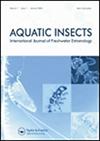Ilybiosoma Crotch的幼虫形态,1873(鞘翅目:双翅目:龙舌兰科):五个近北物种的描述及其系统发育考虑
IF 0.5
4区 农林科学
Q4 ENTOMOLOGY
引用次数: 0
摘要
摘要首次描述了五个近北种的Ilybiosoma Crotch,1873,I.bjokmanae(Hatch,1939),I.lugens(LeConte,1852),I.minnesotensis(Wallis,1933),I.pandurus(Leech,1942)和I.regularis(LeCont,1852。利用TNT程序对龙舌兰亚科7属18种的55个幼虫信息特征进行了初步简约分析。所描述的五种Ilybiosoma的幼虫在形态上非常相似。与所研究的Agabinae的其他物种相比,Ilybiosoma的幼虫因存在强烈微缺的虹吸管而从大多数Agabini中脱颖而出,这让人想起了在Hydrotrupes Sharp,1882和Platynectes Régimbart,1879中观察到的情况。本文章由计算机程序翻译,如有差异,请以英文原文为准。
Larval morphology of Ilybiosoma Crotch, 1873 (Coleoptera: Dytiscidae: Agabinae): description of five Nearctic species with phylogenetic considerations
Abstract The larvae of five Nearctic species of Ilybiosoma Crotch, 1873, I. bjorkmanae (Hatch, 1939), I. lugens (LeConte, 1852), I. minnesotensis (Wallis, 1933), I. pandurus (Leech, 1942), and I. regularis (LeConte, 1852) are described for the first time including a detailed chaetotaxy analysis of the cephalic capsule, head appendages, legs, last abdominal segment and urogomphi. A provisional parsimony analysis based on 55 informative larval characteristics of 18 species in seven genera of the subfamily Agabinae was conducted using the program TNT. The larvae of the five Ilybiosoma species described were found to be fairly similar morphologically. Compared to the other species of Agabinae studied, larvae of Ilybiosoma stand out from most Agabini by the presence of the strongly emarginated siphon, which are reminiscent of the condition observed in Hydrotrupes Sharp, 1882 and Platynectes Régimbart, 1879.
求助全文
通过发布文献求助,成功后即可免费获取论文全文。
去求助
来源期刊

Aquatic Insects
生物-昆虫学
CiteScore
2.00
自引率
25.00%
发文量
27
审稿时长
>12 weeks
期刊介绍:
Aquatic Insects is an international journal publishing original research on the systematics, biology, and ecology of aquatic and semi-aquatic insects.
The subject of the research is aquatic and semi-aquatic insects, comprising taxa of four primary orders, the Ephemeroptera, Odonata, Plecoptera, and Trichoptera but also aquatic and semi-aquatic families of Hemiptera, Coleoptera, and Diptera, as well as specific representatives of Hymenoptera , Lepidoptera, Mecoptera, Megaloptera , and Neuroptera that occur in lotic and lentic habitats during part of their life cycle. Studies on other aquatic Hexapoda (i.e., Collembola) will be only accepted if space permits. Papers on other aquatic Arthropoda (e.g., Crustacea) will not be considered, except for those closely related to aquatic and semi-aquatic insects (e.g., water mites as insect parasites).
The topic of the research may include a wide range of biological fields. Taxonomic revisions and descriptions of individual species will be accepted especially if additional information is included on habitat preferences, species co-existing, behavior, phenology, collecting methods, etc., that are of general interest to an international readership. Descriptions based on single specimens are discouraged.
Detailed studies on morphology, physiology, behavior, and phenology of aquatic insects in all stadia of their life cycle are welcome as well as the papers with molecular and phylogenetic analyses, especially if they discuss evolutionary processes of the biological, ecological, and faunistic formation of the group.
 求助内容:
求助内容: 应助结果提醒方式:
应助结果提醒方式:


